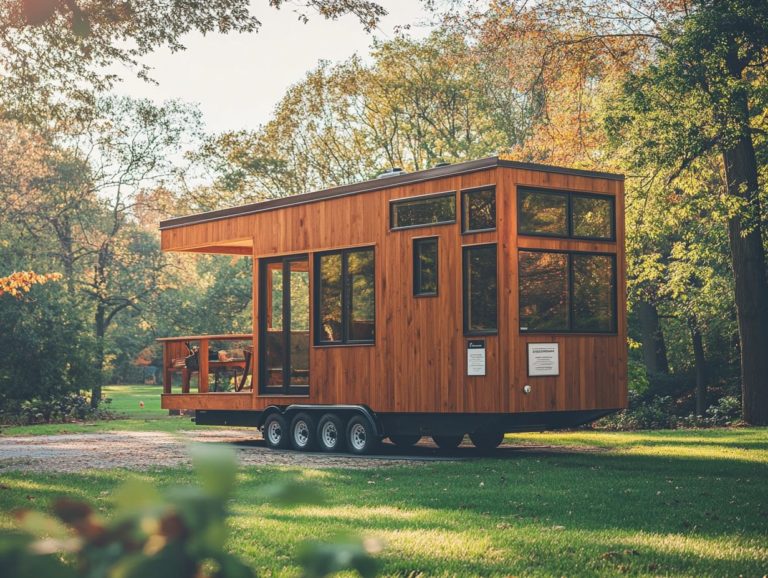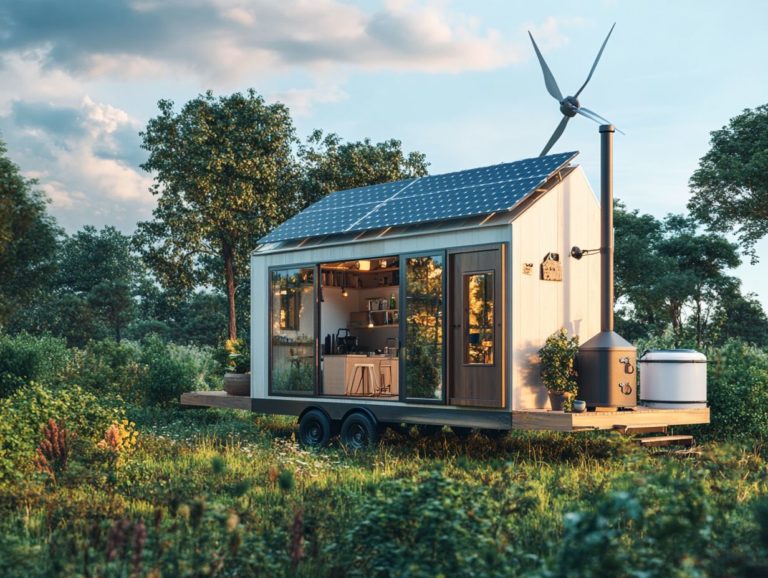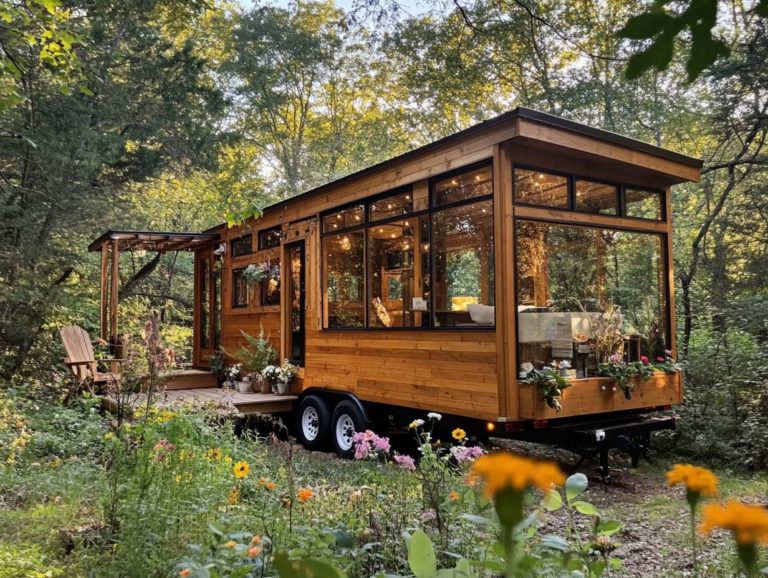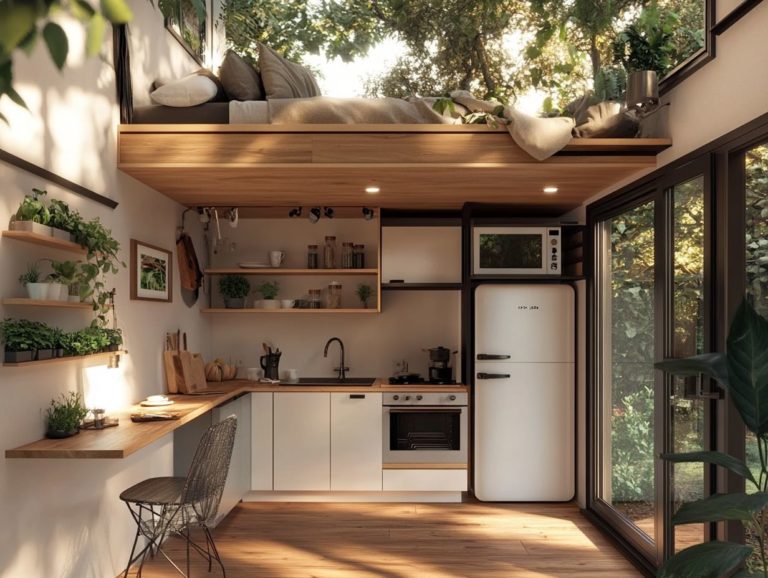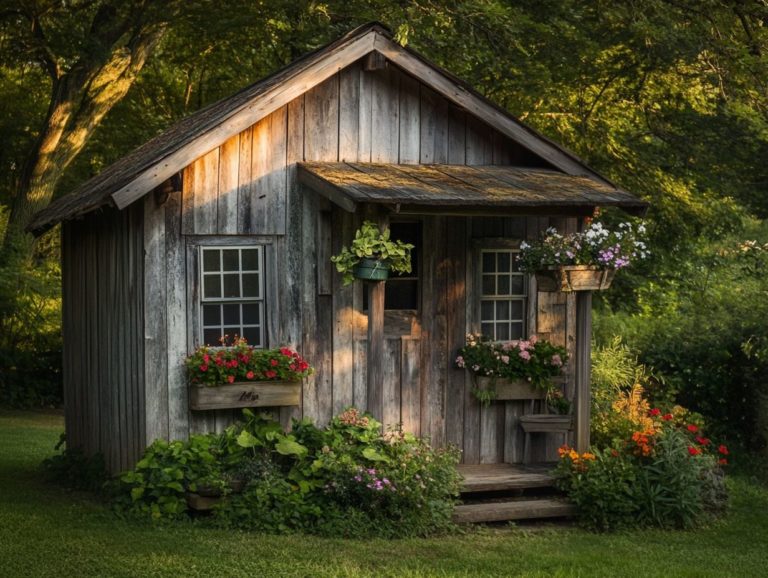Can I Use a Tiny House for Business?
Looking for a new way to live or do business? Tiny houses might just be the answer! Tiny houses have truly taken the world by storm, presenting a remarkable fusion of minimalism, sustainability, and creativity.
Have you considered using one for your business? This article delves into the intricacies of tiny houses, exploring their various types and definitions. You’ll discover the benefits, such as cost savings and flexibility, alongside the challenges posed by legal regulations and space constraints.
You’ll find practical tips for setting up a tiny house business, along with inspiring success stories that showcase the potential of this innovative approach. Whether you re a budding entrepreneur or simply curious, there s a wealth of knowledge to uncover about the tiny house movement’s influence on the business landscape.
Contents [hide]
- Key Takeaways:
- Understanding Tiny Houses
- Benefits of Using a Tiny House for Business
- Challenges of Using a Tiny House for Business
- Tips for Setting Up a Tiny House Business
- Success Stories of Businesses Using Tiny Houses
- Frequently Asked Questions
- Can I Use a Tiny House for Business?
- What type of businesses can I run from a tiny house?
- Do I need a special permit or license to use a tiny house for business?
- Can I use a tiny house for business if I don’t own the land?
- Is it cost-effective to use a tiny house for business?
- What are the benefits of using a tiny house for business?
Key Takeaways:
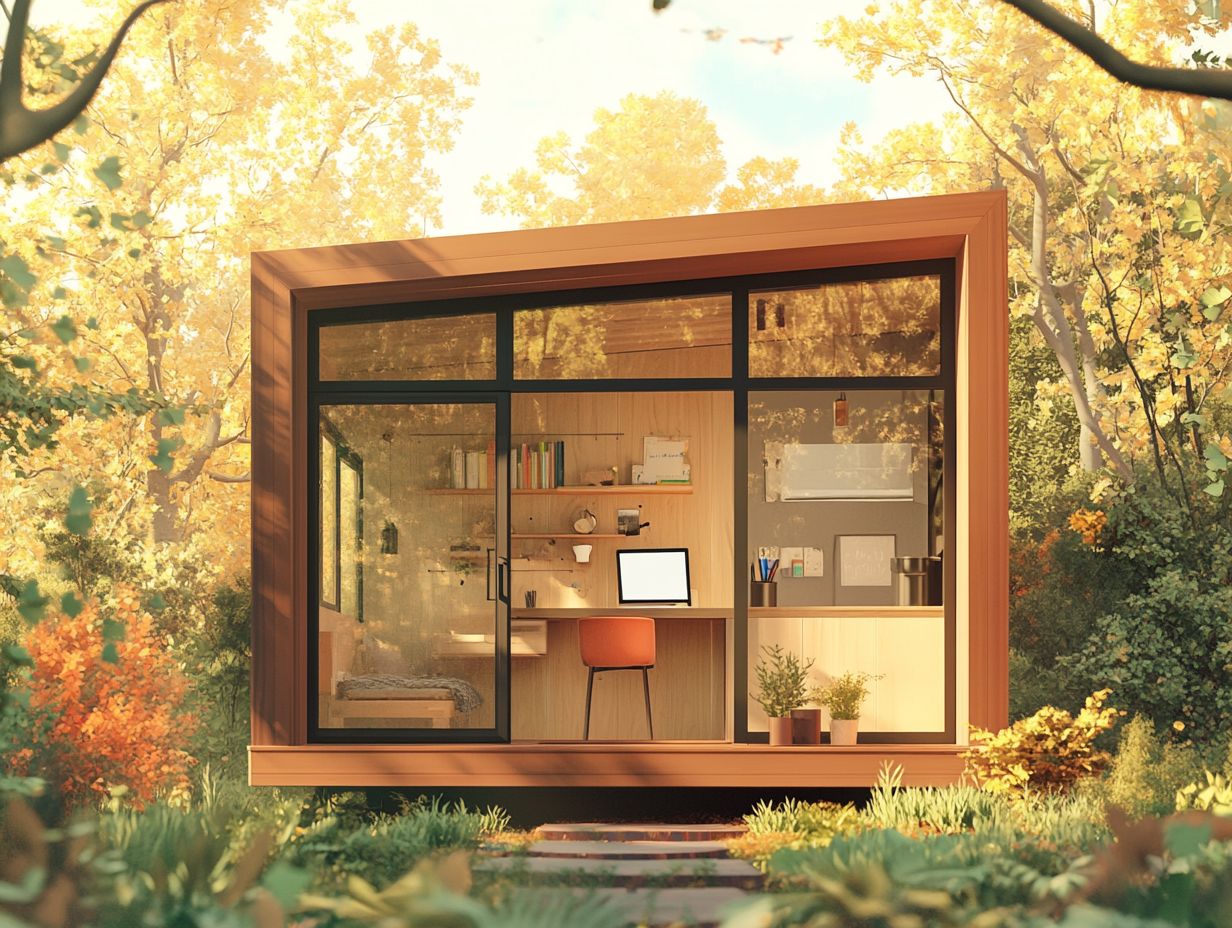
- A tiny house is a small, mobile dwelling that can be used for both personal and business purposes.
- Using a tiny house for business offers cost savings and flexibility, but it also comes with challenges such as legal regulations and limited space.
- To successfully set up a tiny house business, it is important to carefully consider key factors and strategies, and draw inspiration from successful businesses using tiny houses.
Understanding Tiny Houses
To understand tiny houses, explore their definitions and types, and appreciate the growing community that champions eco-friendly living solutions.
The popularity of tiny homes has skyrocketed across the U.S. Captivating those drawn to both affordability and the allure of a minimalist lifestyle, these homes often feature innovative designs.
Leading brands like Mustard Seed Tiny Homes, OBY House, and ESCAPE Traveler have become trailblazers in this movement, providing a rich array of tiny home designs tailored to diverse needs and preferences.
Definition and Types
Tiny homes, often classified into categories like shipping containers and pre-built homes, offer a distinctive approach to housing that emphasizes space efficiency and sustainability.
Among these, traditional tiny houses on wheels (tiny houses on wheels) truly shine with their mobility and off-grid living potential. Typically ranging from 100 to 400 square feet, these homes give you the power to downsize while enjoying the freedom to relocate with ease.
Conversely, shipping container homes blend robust durability with modern aesthetics. Often repurposed from industrial use, they serve as both a stylish residence and a sustainable choice.
Then there are pre-built homes, which present the advantage of quick assembly. Built off-site and delivered as pre-fabricated units, they cater to your desire for efficiency without sacrificing style or comfort.
Each type of tiny home offers unique benefits, appealing to a variety of lifestyles and values in the realm of sustainable living.
Benefits of Using a Tiny House for Business
Utilizing a tiny house for your business presents a wealth of advantages, from substantial cost savings to operational flexibility. It serves as an appealing entry point into the affordable housing market.
By tapping into the burgeoning tiny home trend, you can take advantage of the increasing demand for eco-friendly and budget-friendly living solutions. This business model champions sustainability while opening up distinctive opportunities for small business membership and fostering engagement within local communities.
Cost Savings and Flexibility
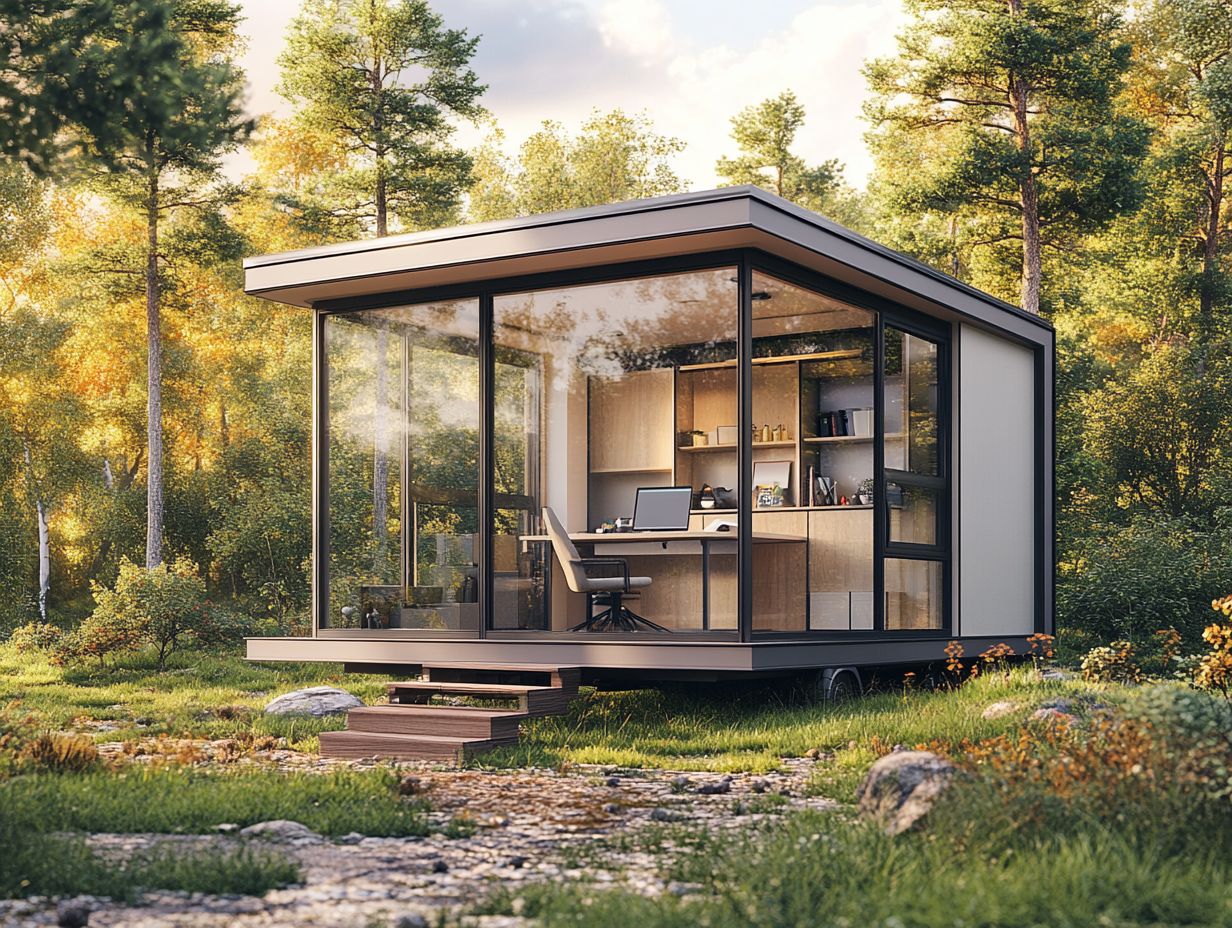
One of the primary benefits of owning a tiny home lies in the significant cost savings that come with its minimalist design.
Additionally, it offers flexibility in various living arrangements.
This reduction in expenses arises from lower construction costs, minimal utility consumption, and decreased maintenance demands.
These financial advantages not only enhance your affordability but also pave the way for innovative solutions in your life.
For example, you could tap into the booming trend of transforming tiny homes into rental properties. This creates an alternative housing option that caters to the rising demand for budget-friendly living.
The mobility of these structures allows them to serve as versatile office spaces.
This is perfect for entrepreneurs like you who seek a unique and cost-effective workspace that adapts effortlessly to your needs without straining your finances.
Challenges of Using a Tiny House for Business
While the benefits of using a tiny house for your business are compelling, it’s important to understand the challenges ahead.
You ll have to navigate legal regulations and deal with space limitations that could hinder your growth.
Legal Regulations and Space Limitations
Legal regulations and zoning laws dictate the feasibility of tiny homes for your business.
These rules often impose restrictions on where and how you can place these structures.
The intricacies of these regulations can vary significantly from one locality to another.
They influence factors such as land use, occupancy limits, and even the types of utilities you can connect.
As an entrepreneur looking to enter this market, you must navigate a complex web of permits and approvals.
This process might delay your timelines and increase initial costs.
These constraints dictate your investment decisions.
You’ll need to weigh the long-term viability of your venture against local government policies.
Ultimately, this can shape how tiny homes are perceived in the broader real estate market, influencing both consumer interest and your potential for profitability.
Tips for Setting Up a Tiny House Business
Establishing a tiny house business requires careful planning and consideration of essential factors that drive sustainable growth and success in the tiny home market.
Key Considerations and Strategies
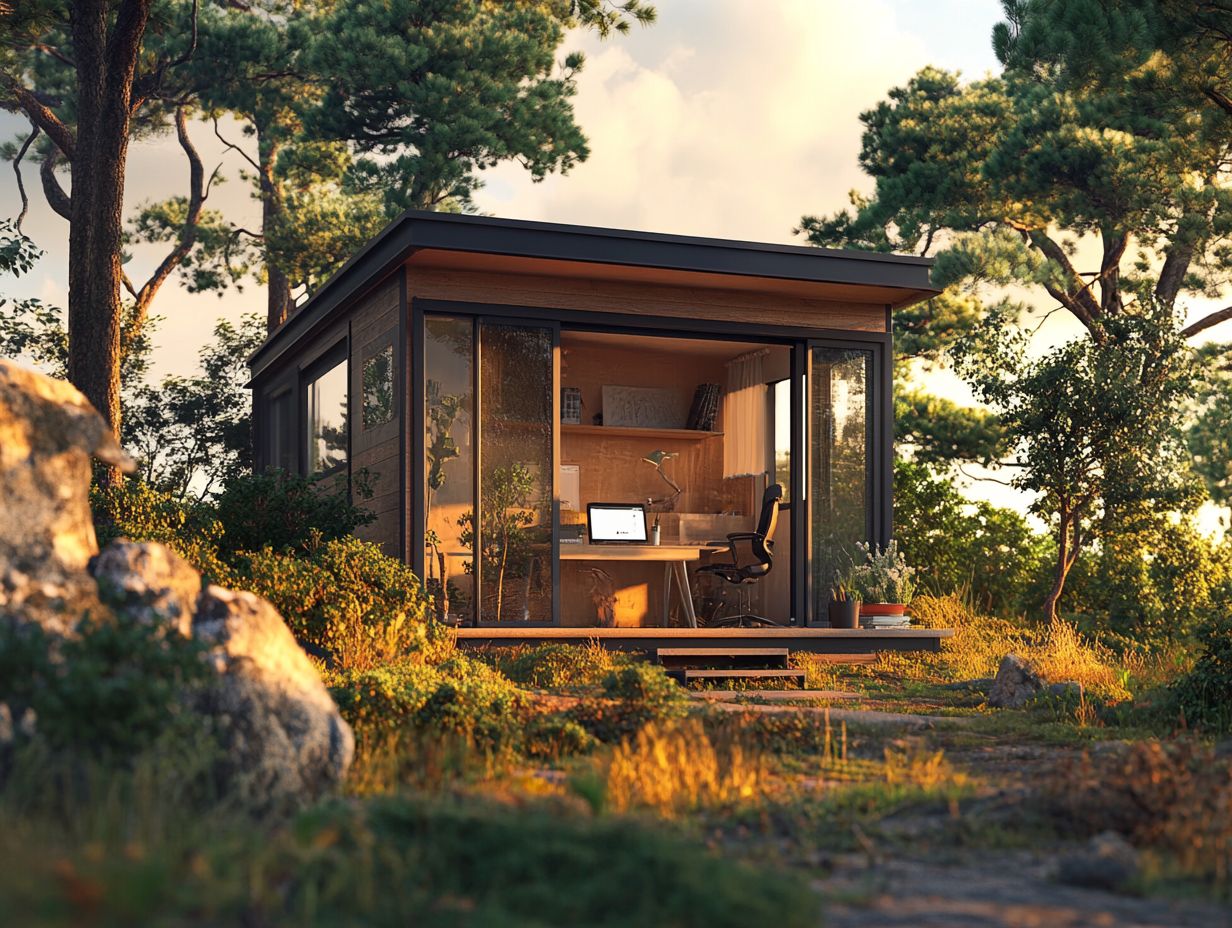
When setting up a tiny house business, consider the following:
- Target audience
- Business model
- Location
These foundational elements are crucial for optimizing success and meeting market demand.
Conducting a comprehensive market analysis can reveal trends and customer preferences, allowing you to tailor your offerings more effectively.
Engaging potential customers through social media platforms and community events fosters a connection that goes beyond mere transactions.
Embracing adaptable business models, like flexible pricing strategies or partnerships with eco-friendly suppliers, can enhance your competitiveness.
For instance, one successful start-up demonstrated its resilience by pivoting from sales to rentals.
This shift allowed them to seize the growing demand for temporary living solutions.
This adaptability not only expanded their market presence but also solidified their brand as a leader in sustainable living.
Success Stories of Businesses Using Tiny Houses
Countless success stories have emerged from the tiny house movement.
Innovative businesses such as Mustard Seed Tiny Homes, ESCAPE Traveler, and OBY House highlight this trend.
These companies have masterfully harnessed the appeal of tiny homes to craft distinctive offerings that resonate with today s discerning consumers.
Inspiring Examples and Lessons Learned
Inspiring examples from the tiny home community, like Mustard Seed Tiny Homes and ESCAPE Traveler, offer valuable lessons for those looking to dive into the tiny house business.
These businesses illustrate new ideas that highlight quality craftsmanship and a strong commitment to sustainable practices and customer engagement. By using green materials and thoughtful design principles, they tap into a growing market that craves sustainable living options. Their interactive customer experiences, such as virtual tours and personalized consultations, cultivate a sense of community and trust.
By observing these success stories, you can find guidance in developing your unique offerings while staying in tune with market demands.
Implementing these strategies will help you forge meaningful connections with your clientele and build a solid foundation for long-term success.
Final Thoughts and Recommendations
The tiny home market is booming. Discover exciting business opportunities in the affordable housing sector.
These opportunities cater to those embracing minimalist living and attract a wider audience interested in sustainability and financial independence.
With millennial buyers and eco-conscious consumers increasingly gravitating toward compact living solutions, the market is primed for creative ventures that resonate with these values.
To successfully enter this industry, stay ahead of market trends, engage with local communities, and incorporate sustainable practices into your development process.
Doing so allows you to meet the pressing demand for affordable housing while adapting to changing consumer preferences.
Maintaining flexibility and a commitment to responsible design will be key to achieving long-term success in this dynamic landscape.
Start exploring your tiny home business idea today!
Frequently Asked Questions
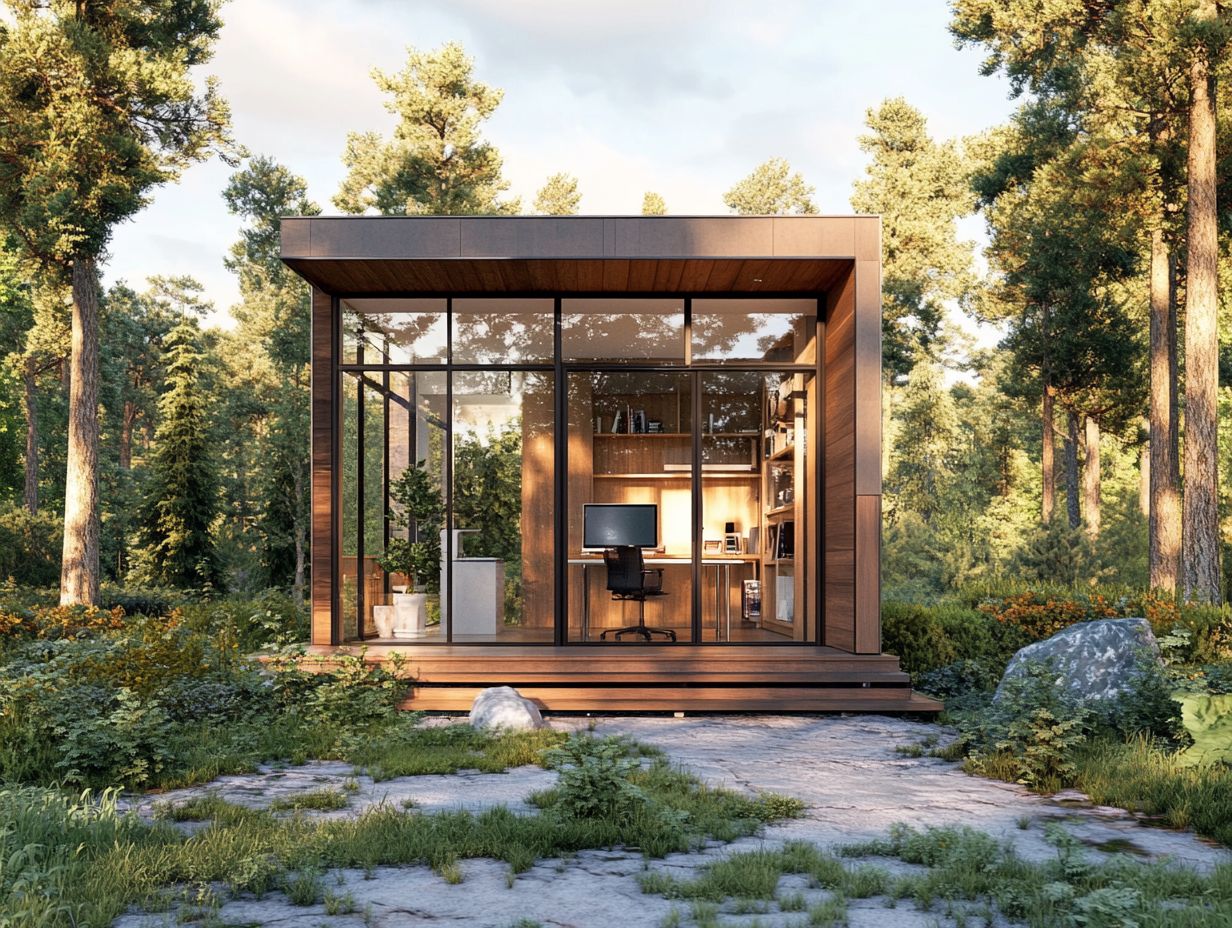
Can I Use a Tiny House for Business?
Yes, you can use a tiny house for business. Tiny houses, like the Tiny SMART House or options from ESCAPE Traveler, have become popular for various uses, including commercial purposes.
What type of businesses can I run from a tiny house?
You can run various businesses from a tiny house, including a home office, retail shop, coffee shop, hair salon, or bed and breakfast. The possibilities are endless! Many entrepreneurs are turning to tiny homes for rent as a unique business opportunity.
Do I need a special permit or license to use a tiny house for business?
It depends on your local regulations and the type of business you plan to operate. Some cities may require a special permit or license for commercial use of a tiny house, while others may not. It’s best to check with your local government for specific requirements.
Can I use a tiny house for business if I don’t own the land?
Yes, you can still use a tiny house for business even if you don’t own the land. However, you will need to get permission from the landowner before setting up your tiny house. It’s also important to ensure the land is zoned for commercial use.
Is it cost-effective to use a tiny house for business?
Using a tiny house for business can be a cost-effective option for many entrepreneurs. Tiny houses are typically more affordable than traditional commercial spaces, and they also require less maintenance and utilities, saving you money in the long run. For those looking at financing options, real estate crowdfunding platforms like Patch of Land can provide valuable resources.
What are the benefits of using a tiny house for business?
There are many benefits to using a tiny house for business. Some main benefits include lower costs, flexibility, and the ability to be mobile. Operating a business from a tiny house can be a unique selling point for your brand, especially in areas like Atlanta, California, and the Hawaiian islands, where demand for innovative living solutions continues to grow.

